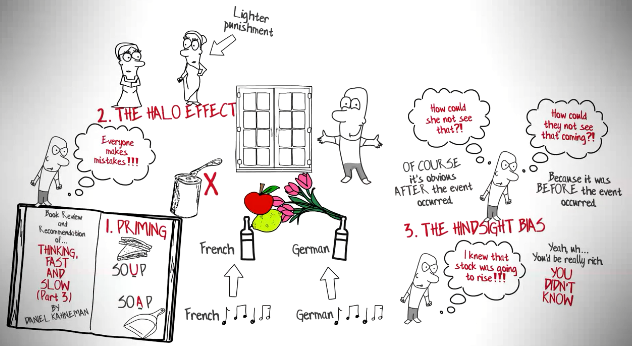If I talk to you about food and then I show you this, you'll put the letter "U" in there.
如果和你谈论食物,并展示给你这个,你会在空白处填上字母“U。”
If I talk to you about cleanliness first and then I show you this, you'll put the letter "A" in there.
如果谈论清洁,你会填上字母“A。”
This is what is called priming. By simply priming people, you can significantly affect their decisions.
这就是所谓的引导效应。通过简单的引导人们,你就可以非常显著地影响他们的决定。
There was a study where a wine store played French music on some days and German music on others,
有项研究,在一个葡萄酒专卖店,轮流播放法国音乐和德国音乐,
and the customers of course would never think that this would affect anything,
顾客们当然不会认为这会产生什么影响。
but they tended to buy more French wines on the days when French music was played,
但是在播放法国音乐的时候,他们倾向于买更多的法国红酒,
and more German wines on the days when German music was played.
在播放德国音乐的时候会买更多的德国红酒。
This is also one of the reasons why when you walk into a store that promotes health and freshness like Whole Foods,
这就是为什么,当你走进一个宣传健康和新鲜理念的商店(例如全食超市)的时候,
you'll probably be greeted with fresh flowers and fruit.
你第一眼看到的很有可能是新鲜的花朵和水果。
It primes you for freshness. The first thing you see will never be canned tuna,
它会让你想到新鲜。你最先看到的肯定不是金枪鱼罐头,
even though you can definitely buy plenty of canned stuff in there.
尽管你肯定也会在那里买很多罐装的东西。
If we really like someone, we tend to really like everything they do and say.
如果真的喜欢某个人,我们就会喜欢他的言行举止,喜欢他的一切。
If they say something average, we might think that it's the best thing we've ever heard,
如果他们说一些稀松平常的事情,我们可能也会认为这是我们听过的最好的事情,
and if they say something stupid, we tend to just go along with it anyway.
如果他们认为某事很愚蠢,我们也会去附和。
And you probably have someone you really admire and if they do say something stupid you'll say,
可能你真的很欣赏某人,如果他们做了一些蠢事,你会说,
"Oh whatever…Everyone makes mistakes…"
“那又怎样…每个人都会犯错…”
But then if someone you didn't like did the exact same thing, you'd be outraged.
但如果是你不喜欢的人做了同样的蠢事,你就会发怒。
And the attractiveness of a person along with other irrelevant factors plays a huge role
一个人的吸引力以及一些其他无关因素
in how much we like what they say and do.
在我们对于他们言行举止的喜好程度上,起着重要的作用。
If we're presented with two women who committed the same crime,
如果我们面对有两个犯同样罪行的女士,
we're much more likely to give a lighter punishment to the more attractive one.
我们很大可能会给那个更有吸引力的女士从轻处罚。
And of course, that doesn't make sense! They committed the same crime! But that is the halo effect.
当然了,这根本不合理!她们犯了同样的罪行!但这就是光环效应。

So next time an attractive person or someone you've put on a pedestal is trying to give you advice,
所以下次如果一个有吸引力的人或者你崇拜的某人尝试给你建议的话,
ask yourself, "Is this advice valuable because it's actually valuable,
问问你自己,“这个建议是真的有价值,
or am I blinded by how he looks, or how big his house is, or how much I like him."
还是我被他的外表,他的房子大小,或者喜欢他的程度蒙蔽了双眼。”
You probably know people who constantly feel the need to say,
你可能知道有些人会时常觉得有必要说,
"Well, I knew that was going to happen…" "I knew that stock was going to fall…"
“我知道那会发生…”“我知道那支股票会跌…”
"I knew that we were going to lose that war…" "I knew that stock was going rise…"
“我知道那场战争我们会失败…”“我知道那支股票会涨…”
This is called the hindsight bias. We tend to be experts at events after they have already occurred.
这就是所谓的后见之明。在某事发生之后我们就成了专家。
It's really weird how you know exactly which stock is going to rise
很奇怪你怎么能确切的知道哪支股票会涨
and which stock is going to fall because you're completely broke.
哪支股票会跌,因为你破产了。
If you actually knew that information, you'd be a really rich person by now.
如果你真的知道那些信息,你现在肯定非常富有了。
And the hindsight bias can go from just annoying to simply dangerous
事后的偏见就会从恼人变为简单的危险
when we start to blame other people for not being able to see something so obvious.
当我们开始指责别人没能够看清如此明显的事情时。
You blame the government for making a certain decision and think, "How could they not see that?"
你指责政府作出的某项决定,并想,“他们怎么没有预计到某事”
Your girlfriend hits a pothole and you get a flat tire and you get all pissed off, "How did she not see that pothole?"
你女朋友撞到一个坑,轮胎漏气了,你很生气,责怪她“你怎么没看见那个坑?”
Well… Because if you were in government, you might have thought
因为,如果你在政府工作,你可能会想
that the decision was actually a good decision at the time it was made,
在做那个决定的时候,确实是个不错的决定,
and if you were driving and looking in the mirror so you could make a turn,
如果你开车的时候看看镜子就能转弯了,
you might have not seen the pothole yourself.
可能你自己也看不见那个坑。
So don't be that annoying person who feels the need to tell everyone
所以不要那么招人讨厌,还感觉有必要告诉每个人
how you knew exactly who was going to win the finals and how the stock was obviously going to rise.
你是多么准确的知道谁会赢得最终的比赛以及股票会有多明显的涨幅。
And definitely don't blame others for something that seems so obvious just because it's already happened.
不要因为某事而责备别人,它也仅仅因为发生了才变得显而易见。
Of course it's obvious now, but it wasn't obvious before it actually happened.
当然了现在看是很明显的,但是在它发生之前就没有那么明显了。
So the 3 big ideas are…
所以三大思维模式…
1. Priming. Realize the power of even the simplest suggestions and what that does to people's behavior.
引导效应。意识到最简单建议的功能,以及会对人们的行为产生什么影响。
2. The halo effect. Stop thinking everything someone says is pure gold just because you really like them.
光环效应。不要因为喜欢某人就认为他说的都是真理。
Chances are everything they say isn't that flawless.
可能他说的每一件事都不是那么的完美。
3. And the hindsight bias. Realize that anyone can be an expert after an event has already occurred.
事后偏见。要知道在某事发生之后任何人都可能成为专家。


